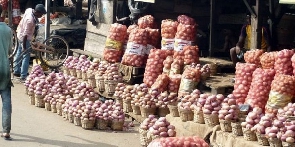Opinions of Tuesday, 15 August 2023
Columnist: Elorm Hermann
Food security in Ghana: From wars to onion woes
In recent times, global disruptions have laid bare the fragile state of food security in Ghana, a nation blessed with abundant natural resources. Its heavy reliance on imports, even for staple foods, has rendered it vulnerable to the whims and uncertainties of global geopolitics and supply chain hiccups. The situation is akin to a well-fed river that paradoxically thirsts for water.
Statistics bear out this worrying trend. According to the United Nations Food and Agriculture Organization (FAO), in 2019 alone, Ghana's food import bill stood at a staggering $2.4 billion. Ghana depends heavily on imported food, including critical staples like wheat, sunflower oil, poultry, and fertilizers from Russia and Ukraine. This is especially alarming considering that agriculture, a sector with immense potential in Ghana, employs over 54% of the country's workforce.
As the distant Russia-Ukraine conflict rages on, Ghana has grappled with soaring prices and shrinking supplies of essentials. With exports from these countries now severely constrained by the war, Ghana faces acute shortages coupled with doubling the prices of some essential food imports. For instance, the price of wheat, an important import from these regions, saw an increase of over 20% in a few months. The economic implications are significant, with Ghana importing tons of wheat annually valued at $246 million. The domino effect on the domestic food industry and households has been palpable, with many finding it increasingly challenging to make ends meet.
The ripples of global unrest aren't the only concern. Closer to home, another supply chain debacle unfolds, highlighting the fragility of the nation's food system. Onions, a staple in many Ghanaian dishes, are primarily imported from neighboring Niger. Yet, recent political instability in Niger, according to an August 9 report by myjoyonline.com, revealed a substantial quantity of these imports finds itself trapped at the borders. Considering that Ghana imports more than 43% of all onions produced in Niger to the tune of about GH¢502 million or approximately $107 million every year, the immediate impact was felt in local markets. Prices for onions surged in certain regions, causing distress among local consumers and businesses.
It's a stark reminder that food security is not just about producing or purchasing enough food but ensuring its unhindered flow from farms to kitchens. These intertwined crises highlight the pressing need for Ghana to reevaluate its food and agriculture policies. The nation must find a balance between external trade and bolstering domestic production, ensuring that when international supply chains falter, the Ghanaian plate remains full.
Towards a self-reliant food landscape
Ghana's agricultural potential remains vastly untapped. Despite being endowed with fertile lands, freshwater resources, and a climate conducive to diverse agricultural activities, the country spends billions annually importing over half its food requirements. This isn't just an economic issue; it's a ticking time bomb for national security, sustainability, and sovereignty. The factors hindering the growth of the sector are multi-fold. Many farmers continue to rely on age-old farming methods, which, while rooted in tradition, often result in low yields. The absence of modern irrigation facilities further exposes crops to the vagaries of weather, with climate change only accentuating these inconsistencies.
The chain of challenges extends from the farms to the markets. Due to limited mechanization, post-harvest losses remain unacceptably high. Poor road networks and lack of adequate storage facilities further complicate the movement and preservation of produce, leading to waste, increased costs, and decreased profitability for farmers.
Financial barriers present another significant hurdle. Many farmers find it challenging to access credit, insurance, and even markets, leaving them vulnerable to both natural and market-induced volatilities. Over-reliance on imported agricultural inputs, such as fertilizers and seeds, has also stunted the sector's growth, making it cyclically dependent on external factors.
While the government's “Planting for Food and Jobs” initiative was a commendable step towards addressing some of these challenges, more robust and sustained efforts are needed to bring about transformative change. A comprehensive strategy needs to be envisioned and executed to steer Ghana toward agricultural self-sufficiency and resilience.
At the foundation, there should be an aggressive push to promote the local cultivation of staple crops like rice, maize, and cassava. This could be achieved through a combination of input subsidies and guaranteed procurement mechanisms that assure farmers of a market for their produce.
Next, infrastructural investments are essential. From expanding irrigation networks to ensuring the widespread availability of mechanized farming equipment, efforts should be directed to maximize productivity. Simultaneously, embracing climate-resilient agricultural practices, such as agroforestry and regenerative farming, can future-proof the sector. Upgraded rural road networks and state-of-the-art storage facilities can minimize post-harvest losses and ensure farmers get better value for their produce.
Financial interventions, such as customized credit facilities and crop insurance, can mitigate risks and empower farmers to innovate and expand. The future of farming should be framed not just as an occupation but as a lucrative business venture. Young minds need to view it as a viable career choice. This transformation can be catalyzed through dedicated training programs, start-up funding, and creating narratives around the success stories in agriculture.
In conclusion, Ghana's dual challenges posed by the Russia-Ukraine conflict and the onion import disruptions serve as critical inflection points. They underline the urgency of transitioning from an import-dependent food system to one that is self-sufficient, resilient, and robust. With concerted efforts, collaborative partnerships, and visionary policies, Ghana can harness its agricultural potential to ensure food security for its people while bolstering its economy and resilience against global and regional risks. The journey may be long, but the seeds of change, once sown, can yield a bountiful harvest.













